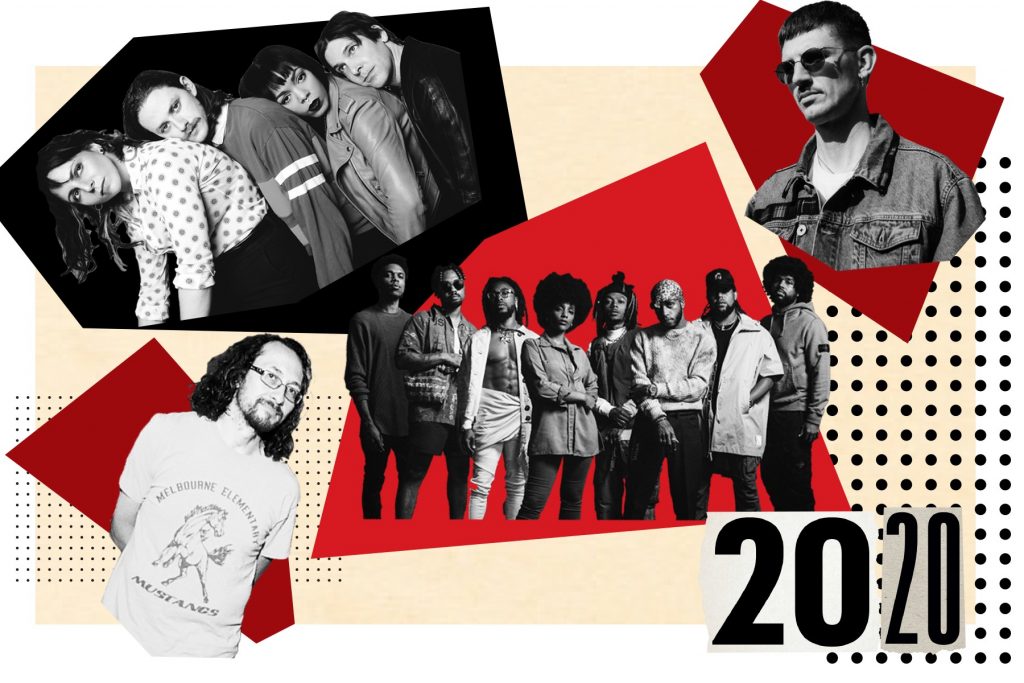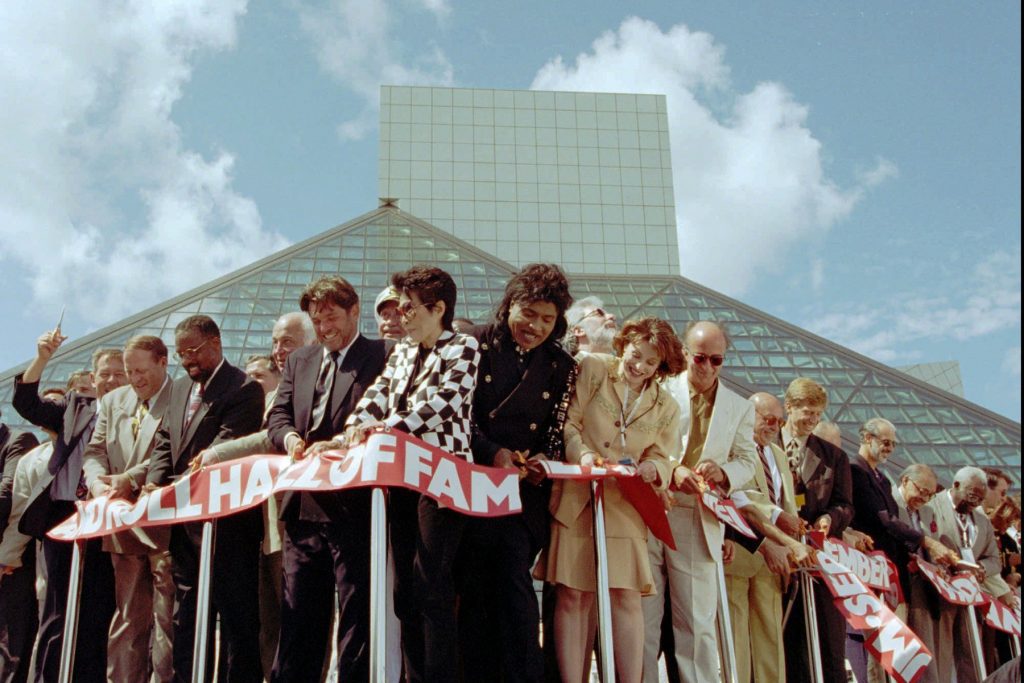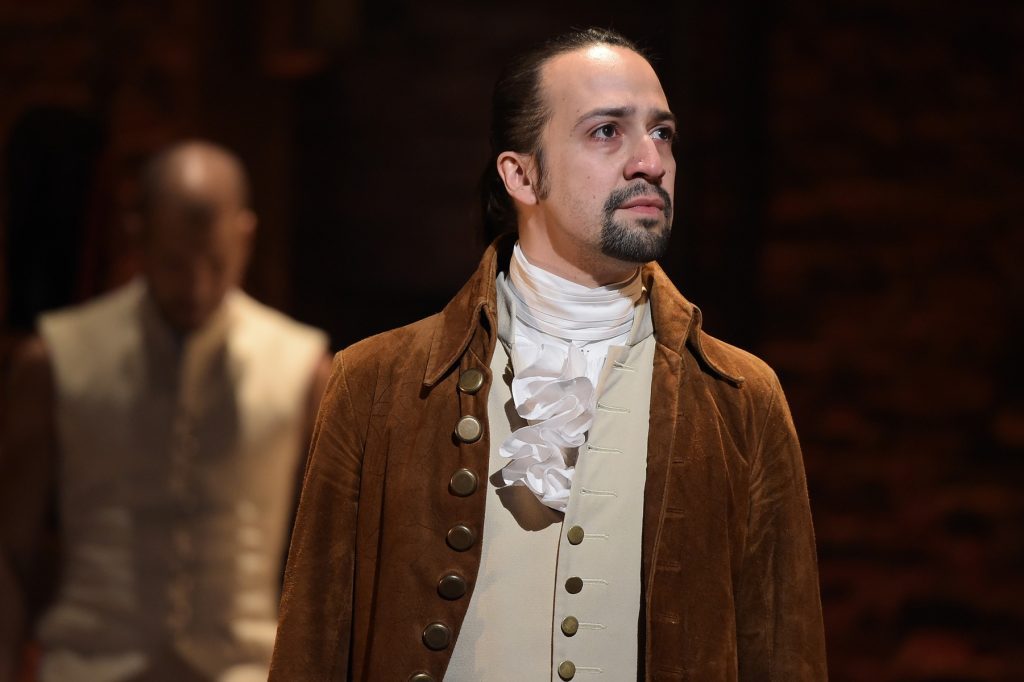
18 Great Albums You Might Have Missed in 2020
It can be hard to keep up with all the new releases out there, even in a year when many of us had nothing but time and unlimited streaming services at our fingertips. Inevitably, there are worthwhile albums that get overlooked by even the most devoted music fans. Some of the albums on this list are DIY gems from the far corners of Bandcamp; others came out on established labels and got a fair amount of attention, but deserved even more. Read on for 18 records from this year that IndieLand staffers think are worth another spin.
Ganser, Just Look at that Sky
With two terrifyingly cool lead vocalists in Nadia Garofalo and Alicia Gaines and a relentless guitar/drum attack from their bandmates Charlie Landsman and Brian Cundiff, this Chicago quartet kicked up one of 2020’s most impressive rackets on their second LP. Post-punk outbursts like “Projector” and “Self Service” (both shouted by Garofalo) hit with just the right intensity to crowd out this headache of a year for a few minutes. Just as impressive were the subtler sounds that emerge on Just Look at That Sky’s back half: “Shadowcasting,” sung by Gaines, is a sparkling slow-burner that recalls mid-2000s Radiohead. The only thing missing was a chance to see how these songs sound in concert — and the webcasts that Ganser put on this year suggest they’ll leave our ears ringing in the best way when they’re able to tour again. — Simon Vozick-Levinson
blogherads.adq.push(function () {
blogherads
.defineSlot( ‘medrec’, ‘gpt-dsk-tab-article-inbody1-uid0’ )
.setTargeting( ‘pos’, [“mid-article”,”mid”,”in-article1″,”mid-article1″] )
.setSubAdUnitPath(“music//article//inbody1”)
.addSize([[300,250],[620,350],[2,2],[3,3],[2,4],[4,2]])
;
});
Spillage Village, Spilligion
This Atlanta-based supergroup featuring Earthgang, J.I.D., Jordan Bryant, 6lack, Mereba, Benji, and Hollywood JB recorded one of the year’s sign-of-the-times statements, folding mid-century country and R&B roots into their gospel-infused hip-hop. A 12-song cycle, their album meditates on faith, white supremacist violence, and impeccable weed while alternating between joyful celebration and solemn mourning. The collective enlists Chance the Rapper, Ari Lennox, and Lucky Daye to riff on Hank Williams and Ray Charles; reflects on pent-up depression (“Shiva”); and turns to prayer on the sorrowful uplift of “Hapi.” And while Spilligion didn’t fly completely under the radar — Barack Obama was among its fans — it’s the kind of record that deserves way more listeners all the same. “You know they say we’re all about to die,” the group sings in unison on the folk-strummed closing credits of “Jupiter.” “And maybe it’s the love we all are tryna find.” — Jonathan Bernstein
Ohmme, Fantasize Your Ghost
This excellent Chicago band has planted deep, wide roots in that city’s music scene, from singing with Chance the Rapper on Coloring Book to sharing stages with Wilco’s Jeff Tweedy. Their second album proves why they’re easily at home in such esteemed company. Fantasize Your Ghost is one of the most imaginative and exciting indie rock releases to come out this year, music that’s always pulling you in unexpected directions and leaving you smiling upon arrival. Sima Cunningham and Macie Stewart weave their voices together like they’re wandering the same dream, at once unsettled, urgant and distracted, while their jagged, rangy guitars recall the vertiginous Nineties epiphanies of the Spinanes, Helium, or Yo La Tengo. There’s taut rock & roll and pure improv, muted beauty and agitated catharsis, making for a record that’s a little off-balance but always in control and pushing ahead, so every pointed impulse or strange feeling they pass through feels brand new and theirs alone. — Jon Dolan
blogherads.adq.push(function () {
blogherads
.defineSlot( ‘medrec’, ‘gpt-dsk-tab-article-inbody2-uid1’ )
.setTargeting( ‘pos’, [“mid-article2″,”mid”,”in-article2″,”mid-article”] )
.setSubAdUnitPath(“music//article//inbody2”)
.addSize([[300,250],[300,251],[620,350],[2,4],[4,2],[3,3]])
;
});
Romare, Home
We hadn’t heard from English producer Romare in two years when he released Home, which finds him building and expanding on his beautiful, genre-bending house, relying less on samples and adding in more of his own sounds, resulting in some of his most sprawling music to date. Given that it’s also some of his hardest, it was a bit of a taunt that we gotHome in the middle of the summer that never was, when clubs worldwide were empty. But while its songs are as spacious as a club and hard enough to get an entire dancefloor moving, there’s just the right of melancholy to make Home feel, at times, like the house fan’s equivalent of a comfort song. The standout is opener “Gone,” a masterful dancefloor filler that pairs a barbed bassline with cooing vocals and forlorn piano, a cinematic slow build that’s house music at some of its best. — Emily Blake
Joan Osborne, Trouble and Strife
A quarter-century after “One of Us,” Osborne remains an undervalued resource as interpreter (her Dylan covers), band member (an early member of Trigger Hippy), and record maker (check out later work like 2014’s Love and Hate). She’s always been adept at making roots music sound saucily modern and vivacious rather than dutiful, an approach that continues on Trouble and Strife. Even when she adheres to soul and R&B basics, she’s not afraid to have her musicians toss in a proggy synth or metallic guitar, and she still sings with a throaty purr that nods to the past but never feels simply imitative of anything. For added contemporary flavor, this album of largely Osborne originals is also among her most somber, addressing immigration (“What’s That You Say”), cultural corruption (“Hands Off”), sexual identity (“Boy Dontcha Know”), and the age of misinformation (“That Was a Lie”). The world’s a mess, but Trouble and Strife makes it sound like a place you’d still want to visit now and then. — David Browne
KeiyaA, Forever, Ya Girl
The R&B singer and producer KeiyaA is chiefly concerned with edification. She says as much on “Rectifiya,” from her 2020 debut: “I predicate my consciousness/And state of well-being on my own feelings,” she sings. The gravity of the statement isn’t immediately apparent. KeiyaA’s power is in gracefully carrying the weight of the divine and laying it gently at your feet, and her hushed delivery holds reverence in each breath. Lyrically, KeiyaA’s lens is pristinely focused. There are anthemic demands for inner peace and reflections carefully attuned to the truth (“Gone for so long/ I can surely afford to be in the rain,” she sings on “hvnli”). That she also produced the album is unsurprising. KeiyaA makes songs to experience completely; it’s only right that she put everything into it. — Jeff Ihaza
blogherads.adq.push(function () {
blogherads
.defineSlot( ‘medrec’, ‘gpt-dsk-tab-inbodyX-uid2’ )
.setTargeting( ‘pos’, [“mid”,”mid-articleX”,”in-articleX”,”mid-article”] )
.setSubAdUnitPath(“music//article//inbodyX”)
.addSize([[300,250],[300,251],[3,3],[620,350]])
.setLazyLoadMultiplier(2)
;
});
Psychic Temple, Houses of the Holy
Two years ago, SoCal studio cultist Chris Schlarb, a.k.a. Psychic Temple, announced a new project in which he would collaborate with four completely different artists for each side of a double album. He called it Houses of the Holy — which made sense, coming after albums titled I, II, III, and IV — and introduced it with a fun EP of desert-singed garage-pop tunes made with Los Angeles’ Cherry Glazerr. The full 2-LP adventure, rolled out this September, features those songs plus some jazzier moods with cornetist Rob Mazurek’s Chicago Underground trio; paisley-hued psychedelic rock with the Dream Syndicate; and big-band backpack rap with local MC Xololanxinxo. All those sounds hang together with the logic of a long, weird dream, thanks to Schlarb’s instinct for unlikely musical connections. As a generous celebration of what can happen when you put a bunch of talented people together in one room — in this case, Schlarb’s Long Beach, California, studio, Big Ego — Houses of the Holy was all the more welcome this lonely year. — SVL
Sara Schoenbeck and Wayne Horvitz, Cell Walk
Thirty years ago, pianist Wayne Horvitz was playing some of the most hyperactive music imaginable with John Zorn’s genre-scrambling Naked City band. In contrast, Cell Walk — a 2020 duo disc with bassoonist Sara Schoenbeck, his longtime collaborator, named after an early Cecil Taylor classic — couldn’t have felt more patient. The pair operates here at the midpoint between chamber music and jazz, performing spare and often disarmingly lovely compositions that flow into free-roaming yet hyper-attuned improvisation, sometimes accented by subtle electronics. Recorded in summer 2019 and January of this year, this is music of otherworldly calm, filled with purposeful pauses, and built around the balletic coordination of two musicians sharing the same space. Put another way, it’s the sonic antithesis of 2020 — a memento from a simpler, more connected time. — Hank Shteamer
Porridge Radio, Every Bad
Porridge Radio isn’t wasting time. When Dana Margolin, the British indie band’s frontperson, begins singing about feeling bored to death and argumentative at the start of their second album, she dives right in, propelled by unhinged sincerity and attention-grabbing rhythm guitar. While this isn’t technically a quarantine record — much of it focuses on the growing pains of young adulthood — the palpable frustration that powers Every Bad has felt increasingly relatable in the months following its Q1 drop. The album is a cathartic release akin to screaming bloody murder into a pillow. That’s to say it’s emotional, exhilarating, and rehabilitating — not literally screamo. Whether she’s focusing on finding hope in dark times (“Lilac”) or learning to set necessary boundaries (“Give/Take”), Margolin’s poetic lyricism is both melancholic and oddly joyous. The music can be brash, but calling it “punk” would be a misstep considering its nuanced elegance and production that skillfully allows impish synths and charming violins to dance around warm drums and angsty guitars. This is a “What’s it all about? And who the hell am I?” kind of record. Every Bad makes its listener feel alive because it forces its listener to feel something— even if that something changes with each listen. — Samantha Hissong
blogherads.adq.push(function () {
blogherads
.defineSlot( ‘medrec’, ‘gpt-dsk-tab-inbodyX-uid3’ )
.setTargeting( ‘pos’, [“mid”,”mid-articleX”,”in-articleX”,”mid-article”] )
.setSubAdUnitPath(“music//article//inbodyX”)
.addSize([[300,250],[300,251],[3,3],[620,350]])
.setLazyLoadMultiplier(2)
;
});
Ribbon Stage, My Favorite Shrine
This NYC/Olympia trio’s debut EP was more fun than most full-lengths in 2020. The elements are nothing new — take some lo-fi guitars and sweet melodies, shake ’em up and perform with great feeling — but Ribbon Stage make every note sting as freshly as your first unrequited crush. Songs like “Rid Myself,” “Reasons Why,” and the excellently titled “Cry in the Driveway” are mini-masterpieces of sulky garage pop, and they all clock in at under two minutes. At that length, any fan of this kind of music would be fooling themselves if they don’t give My Favorite Shrine at least one listen through. Once you do, the hooks are there to stay. — SVL
ARO, Vacare Adamaré
ARO, the stage name for Aimée Osbourne, is the mysterious eldest daughter of Ozzy and Sharon, who famously refused to appear on The Osbournes alongside Kelly and Jack because she wanted privacy and normalcy in her life. Judging from her years-in-the-making debut, Vacare Adamaré, she has used her time out of the spotlight to develop a sharp, personal artistic aesthetic — electropop that draws heavily from early Nineties trip-hop, dance music, and even R&B — that is similar to the Prince of Darkness’ moon-barking only in its shadowy arrangements. Standouts “Shared Something With the Night” and “House of Lies” reflect a unique longing in their eerie keyboard arrangements and Osbourne’s lyrics about star-crossed love gone bad. Meanwhile “Shark Knight” shows a more whimsical side of ARO with a buoyant beat akin to a chopped-and-screwed version of Siouxsie and the Banshees’ “Peek-a-Boo” and a bizarre sample of Alfred Hitchcock talking about “a maniacal woman” between her vocals. The LP is a well-tempered moodpiece, proof that Osbourne used her time well tapping into the depths of her soul. — Kory Grow
Jonathan Terrell, Westward
Don’t let the hat and Texas lineage fool you: Jonathan Terrell is not a typical cowboy singer. He proved it on this superb journey through a new American West, a naturally blended mix of U2 guitars, Nick Cave intensity, and dreamy studio effects. Terrell used to moonlight as a DJ, and the diverse sounds he absorbed while spinning tracks pop up throughout Westward. There are tones of the Jesus & Mary Chain on “Raining in Dallas,” haunting Mazzy Star atmospherics on “Star Child,” and vintage boardwalk organ on “Good Again.” The songwriting is like a richly detailed painting, too: “Staring at the underpass through the chain link/Nobody ever seems to know what you’re thinking,” he sings in “Raining in Dallas.” While country music can often be myopic, Westward is a record with a broad view, one informed by Terrell’s experience. — Joseph Hudak
blogherads.adq.push(function () {
blogherads
.defineSlot( ‘medrec’, ‘gpt-dsk-tab-inbodyX-uid4’ )
.setTargeting( ‘pos’, [“mid”,”mid-articleX”,”in-articleX”,”mid-article”] )
.setSubAdUnitPath(“music//article//inbodyX”)
.addSize([[300,250],[300,251],[3,3],[620,350]])
.setLazyLoadMultiplier(2)
;
});
Kitchen, Halloween in August
Few albums captured the relentless anxiety and cozy malaise of 2020 like Halloween in August, from bedroom-folk Bandcamp auteur James Keegan, who records as Kitchen. On one of several Kitchen releases from 2020, Keegan transforms relationship strife into a shockingly prescient solo soliloquy, from the poignant end-times companionship of “World is Big” to the acceptance of cataclysmic change on the closing “Circle Walk.” “So we rise to walk the dog a circle/and stamp our boots outside,” Keegan nearly whispers over an acoustic guitar, “It’s never gonna come back/No way.” — JB
Honne, No Song Without You
The music of Honne often feels like a warm hug, and their latest mixtape is no exception. While this isn’t the electronic duo’s best project yet — it’s a mixtape, people — it is a refreshing invitation to be happy. In Honne’s signature fashion, they present a well-blended collection of soul, R&B, and retro pop elements for the digital world. The slow-burn dreaminess of the album’s Sixties-inspired title track soothes, before the infectious bass-driven energy of the “Free Love” chorus enlivens. On “By My Side,” drum-machine claps live in harmony with tender piano playing. “La La La That’s How It Goes” is a reminder to lift yourself and others up when you can. The latter’s almost-juvenile nature appears to be an intentional reminder to stop taking every damn thing so seriously. And if you find yourself rolling your eyes, just wait for those delectable, ELO-reminiscent strings that come in around the bridge and again at the song’s end. The mixtape ends with a spoken-word monologue encouraging listeners to be more neighborly, present, open-minded, and grateful. This project is the epitome of kill ‘em with kindness — and, in 2020, there’s certainly nothing wrong with that. — SH
Westerman, Your Hero Is Not Dead
Westerman’s debut album is for fans of Talk Talk acolytes — Bark Psychosis, Wild Beasts, These New Puritans, and other adherers of the post-rock doctrine that mandates silence be an instrument. Singer Will Westerman is perhaps Talk Talk’s most ardent disciple of all, using the album’s title track as a tribute of sorts to that band’s late singer, Mark Hollis. Following a string of potential-scratching, increasingly promising singles over the past few years — including a few re-recorded for this LP — Westerman’s first full-length quietly arrived this summer like a calm breeze amid a tempestuous year. The pristinely produced record blends flanged guitars, muted beats, warm synths, and subtle hooks that reveal themselves on repeat listens. Once indoctrinated, also check out Westerman’s recent Choupana EP, containing three early sketches of Your Hero Is Not Dead tracks, including an acoustic “Blue Comanche” that rivals the essential album version. — Daniel Kreps
blogherads.adq.push(function () {
blogherads
.defineSlot( ‘medrec’, ‘gpt-dsk-tab-inbodyX-uid5’ )
.setTargeting( ‘pos’, [“mid”,”mid-articleX”,”in-articleX”,”mid-article”] )
.setSubAdUnitPath(“music//article//inbodyX”)
.addSize([[300,250],[300,251],[3,3],[620,350]])
.setLazyLoadMultiplier(2)
;
});
Guided By Voices, Styles We Paid For
When a band regularly puts out three albums per year, it’s easy to miss one or two. But if you’re going to listen to one Guided By Voices record from 2020, it should undoubtedly be Styles We Paid For, which dropped in December. GBV is always good for some straight-ahead rock & roll, but this 15-song collection of tracks contains some true rippers: “Mr. Child,” an infectious piece of power-pop about an ominously Peter Pan-esque character, showcases an earworm of a riff from guitarist Doug Gillard. The nearly meaningless phrase “propulsive drums” gains actual relevance in “Electronic Windows to Nowhere” as endlessly tight drummer Kevin March accompanies frontman Bob Pollard as he waxes poetic on the Internet. (The album’s initial title was Before Computers, after all.) The whole record is a marvel in virtuosity, as the pandemic forced each member — all marooned in different states — to record their parts separately, Pollard’s acoustic demos their only guide. For a band that thrives on live performance and in-person chemistry, Styles We Paid For is an impressive feat — every song just goes. — Brenna Ehrlich
Bob Vylan, We Live Here
Anyone who clicked on this London duo’s EP because of their punny name found something much better than a cheap laugh. We Live Here deploys an extremely British mix of pummeling metal guitars and shouted grime vocals for a scorching critique of racism in the U.K., as heard on the title track: “Neighbours called me n—–/Told me go back to my own country/Said since we arrived this place has got so ugly/But this is my fucking country/And it’s never been fucking lovely!” While Bob Vylan don’t sound anything like their namesake, there’s an urgency to their message that does recall a certain side of that other Bob in his youth. — SVL
SVRCINA, Elysian Fields
Nashville-based singer SVRCINA has won fans in recent years through her music’s appearances on TV shows such as Legacies, Shadowhunters, and Containment, along with key Spotify editorial playlists. Her first full-length project, Elysian Fields, is an excellent indie pop set that seamlessly weaves strong production, incredible vocals, and emotional lyricism. A standout track is the delicate ballad “Soon,” where she reminds us that “life is so uncertain, but it’s still worth it, all the highs and lows.” Another favorite is the jump-out-of-your-seat pop anthem “Runaway W. You,” about the excitement that comes with experiencing a new-found love. — Andrew Firriolo
blogherads.adq.push(function () {
blogherads
.defineSlot( ‘medrec’, ‘gpt-dsk-tab-inbodyX-uid6’ )
.setTargeting( ‘pos’, [“mid”,”mid-articleX”,”in-articleX”,”mid-article”] )
.setSubAdUnitPath(“music//article//inbodyX”)
.addSize([[300,250],[300,251],[3,3],[620,350]])
.setLazyLoadMultiplier(2)
;
});




